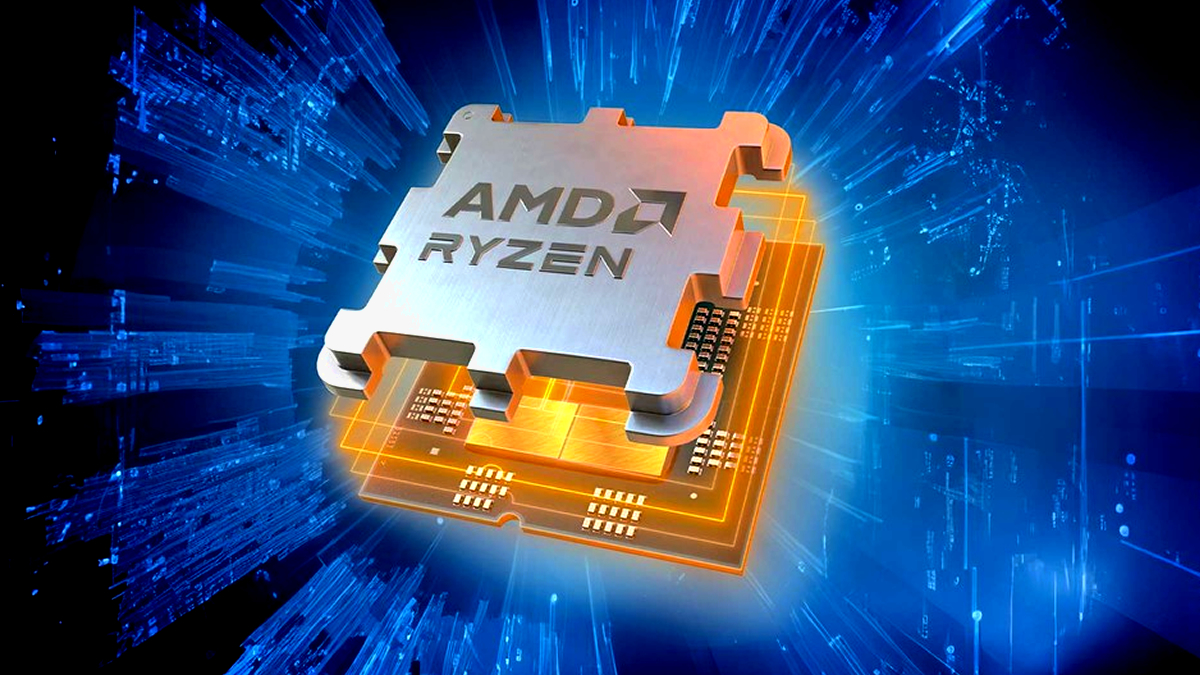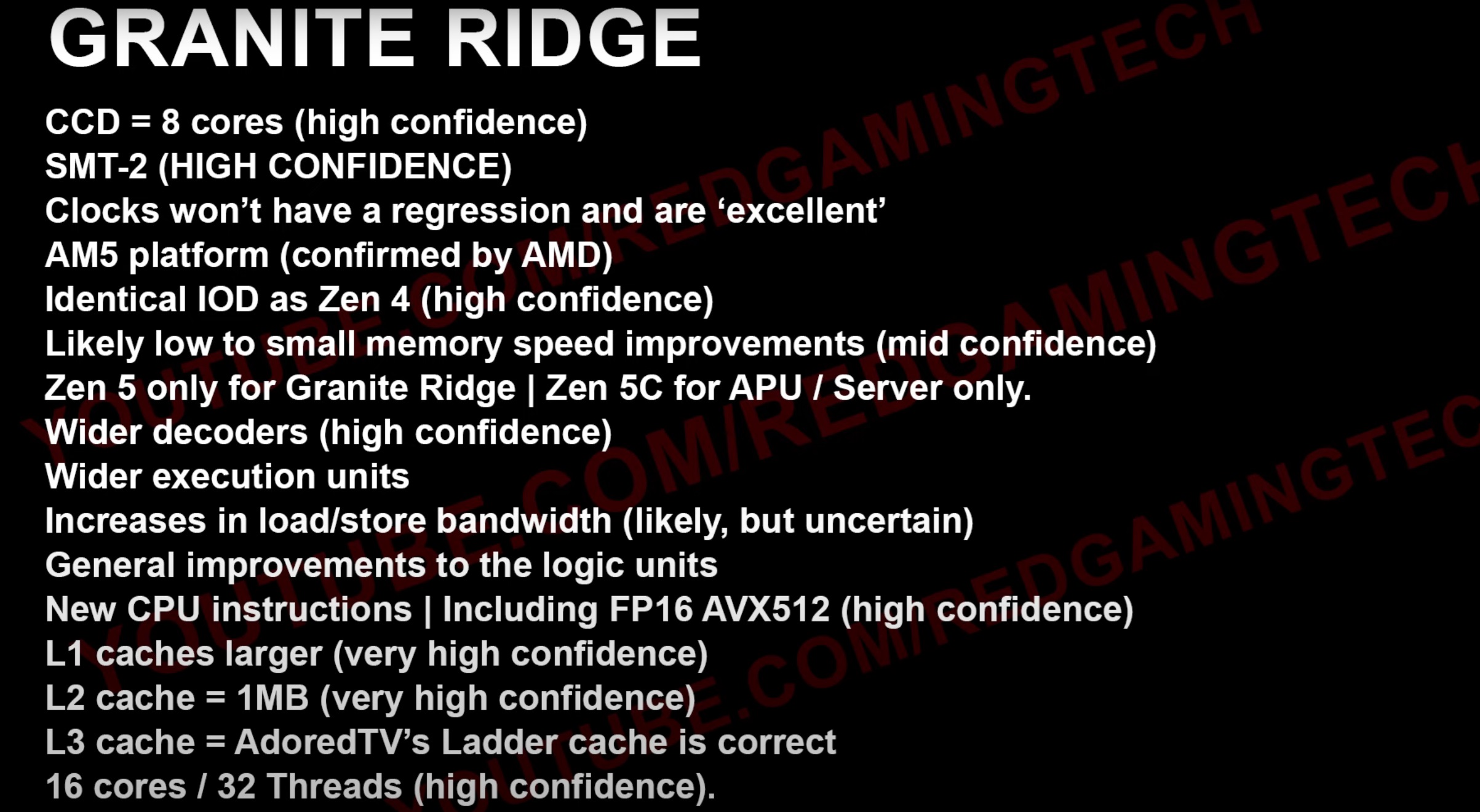AMD to “DOMINATE” with huge Zen 5 IPC gains – Leaker Claims
YouTuber hints at “30%” IPC gains for AMD’s next-generation processors
AMD are due to launch their next-generation Zen 5 CPUs later this year, and rumour has it that these processors will deliver insane IPC gains. With Zen 5, AMD are building a “new grounds up microarchitecture”, which means PC enthusiasts can expect a lot of internal changes with next-generation Ryzen processors.
Red Gaming Tech has now reported that “30%” IPC gains for AMD Zen 5 processors now “seems very certain”. This claim comes from “multiple sources”, with some claiming that larger performance gains are possible in specific applications.
If these claims are true, Zen 5 will deliver AMD their largest generational performance leap since the introduction of Zen. With Zen 5, AMD are also reportedly able to maintain clock speeds that are similar to Zen 4, with higher clock speeds being possible for high-end Zen 5 products. AMD’s Zen 5 Ryzen processors are also expected to support higher memory clock speeds than Zen 4, thanks to its similar, but improved I/O die (IOD).
What are IPC gains, and why do they matter for AMD/Zen 5?
CPU performance can be improved by running processors at higher clock speeds, or by delivering more performance per clock cycle. IPC is short-hand for Instructions Per Clock, and PC enthusiasts typically use the term to describe gen-on-gen performance gains for processors. If CPUs are running at the same clock speeds, the processor with their higher IPC levels will complete tasks faster.
With every new CPU architecture, manufacturers aim to achieve IPC enhancements though processor design changes. Since PC workloads can vary significantly, IPC enhancing architectural changes will not necessarily benefit all potential workloads. Some workloads will benefit more from specific changes than others, which means that a new CPU’s IPC gains can vary significantly on a workload-by-workload basis. This is why manufacturers typically market averaged IPC gains across a wide range of workloads. This creates a “typical” IPC gain that can be marketed to customers.
Assuming that AMD has a “30%” averaged IPC gain for Zen 5, PC builders should expect some workloads to run more than 30% faster and others to run less than 30% faster. This means that some workloads could achieve insane performance gains with Zen 5. Other workloads will achieve more moderate performance benefits. Once Zen 5 launches, reviewers and enthusiasts will be able to discover and report on which applications receive the largest performance benefits.
Zen 5 needs huge IPC gains to be a worthwhile upgrade
AMD’s Zen 5 desktop CPUs will reportedly launch with the same maximum core count as their Zen 4 predecessors. Clock speeds are also reportedly remaining the largely the same with Zen 5. This means that Zen 5’s performance gains over Zen 4 are solely reliant on IPC gains. While 30% IPC gains are huge, AMD promised sweeping architectural changes with Zen 5.
With Zen 5, AMD plans to make a huge number of changes to their core design. If these design changes work as intended, they will result in increased CPU performance. With enough small changes, large performance gains are possible.
Zen 5’s rumoured architectural enhancements
When AMD first discussed Zen 5, they confirmed that the architecture was a “new grounds-up microarchitecture”. The design was said to deliver “enhanced performance and efficiency”. The design was also said to feature a “pipelined front-end and wide-issue”, and “integrated AI and ML optimisations”.
Aside from these confirmed changes, AMD’s Zen 5 CPUs are said to feature an enlarged L1 cache. Faster DDR5 memory support has also been claimed. Additionally, Zen 5 will reportedly feature an L3 “ladder cache”, which replaces the ring-bus style cache of older Zen CPUs. Simply put, this new design is intended to reduce core-to-core latencies within a single CCD and reduce L3 cache latencies. All of these memory and cache changes should result in notable performance gain in all memory or cache sensitive workloads.
Zen 5 will also reportedly feature wider decoders and wider execution units. Improved logic units have also been reported. With large and small changes across seemingly all areas of Zen 5, it is easy to see why large performance gains are possible. It is also easy to see how practically all workloads can benefit from Zen 5’s design changes.
While AMD’s leaked Zen 5 IPC gains are huge, this is certainly the kind of upgrade I want to see from AMD. Like all PC enthusiasts I want to see hardware get faster and faster, but like all leaks or rumours, I’d take this information with a large helping of salt. If these rumours are true, 2024 is going to be a great year for AMD.
You can join the discussion on AMD’s rumoured IPC gains for their Zen 5 processors on the OC3D Forums.






